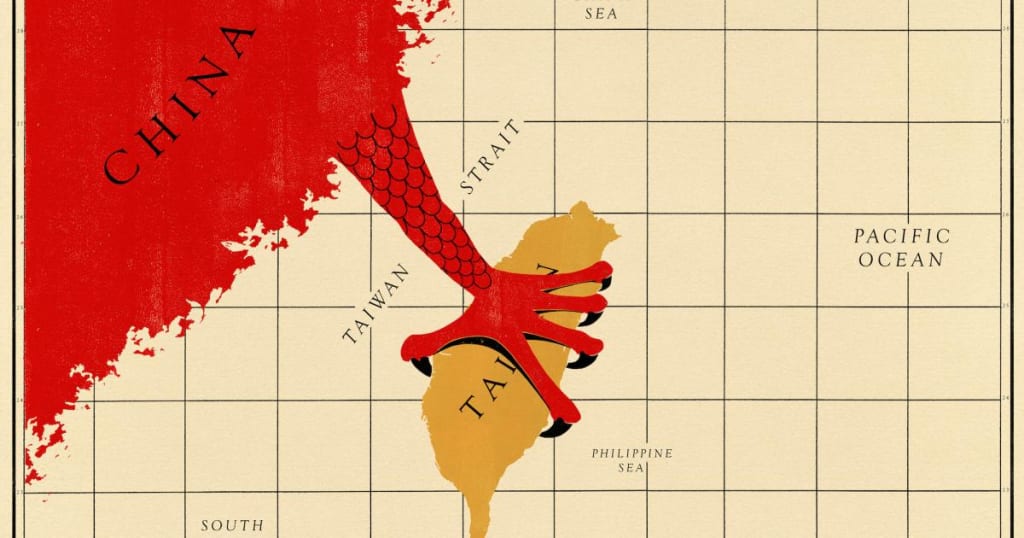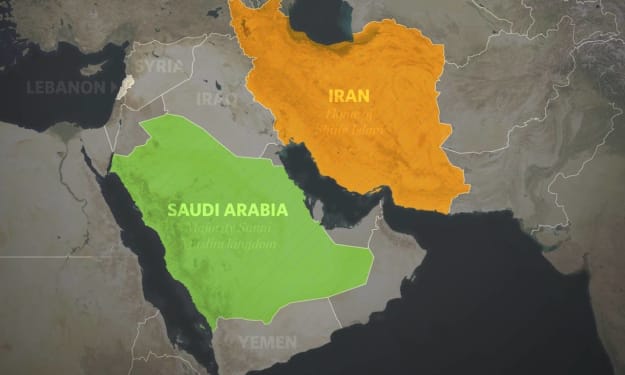Taiwan Under Threat: Growing Fears of a Chinese Invasion 🇹🇼 🇨🇳🪖
Taiwan's growing concern over the rising possibility of a Chinese invasion

As tensions continue escalating across the Taiwan Strait, concerns are mounting in Taipei about the rising possibility of a Chinese invasion. For decades, Taiwan lived under the constant threat of military action from China to forcibly reunify the island. However, in recent years analysts warn the risks have never been greater as Beijing's military develops the capabilities needed to seize Taiwan by force. China has long viewed Taiwan as a renegade province that must eventually be brought back under its control. When the Chinese civil war ended in 1949, Chiang Kai-shek's defeated nationalist forces retreated to Taiwan while Mao Zedong's communists established control over mainland China. Despite the separation, Beijing has never renounced the use of force if necessary to impose reunification. Under its "one China" principle, the communist government asserts ultimate sovereignty over Taiwan. However, for much of the post-war period the balance of military power rested firmly in Taiwan's favor, giving Beijing little realistic hope of conquering the island. As decades passed with no peace deal to formally end the civil war, Taipei gradually transformed into a vibrant democracy clinging defiantly to its effective independence. This changing status quo has infuriated Chinese leaders determined to prevent Taiwan's de-facto secession. Over the last two decades especially, Beijing has poured immense resources into upgrading the People's Liberation Army. Once outmatched by Taiwan's smaller but modern forces, China can now credibly threaten an invasion on an unprecedented scale. Its rapidly expanding navy, with over 350 warships including advanced aircraft carriers and destroyers, dwarfs Taiwan's fleet. Meanwhile, over a thousand ballistic and cruise missiles are aimed at the island from bases along the coast. The balance of air power has also swung heavily in China's favor through investments in stealth fighters, bombers and supporting aerial tankers. Intelligence indicates the PLA is capable of mounting large-scale air and sealift operations, suggesting it has attained the minimum capabilities needed for a full-scale amphibious invasion of Taiwan. Such an undertaking would still come with enormous risks, but military experts assess China could now overwhelm the island's defenses in a short period through sheer numerical superiority if it committed all available forces. Expanding Exercises and shows of force by the PLA around Taiwan aim to steadily ratchet up pressure and intimidation. Since 2020, sorties by Chinese warplanes crossing the unofficial mid-line of the Taiwan Strait have become routine occurrences, testing Taipei's air defenses. Meanwhile ballistic missiles have been test-fired on trajectories routinely passing over the island. The message being steadily reinforced is that Beijing can blockade or bombard Taiwan at will in a crisis. These displays intensified after U.S. House Speaker Nancy Pelosi's controversial visit to Taipei in August 2022, which infuriated Chinese leaders. In response, the PLA launched its largest ever drills simulating an invasion of the island. Strike aircraft and warships effectively practiced surround Taiwan while missiles flew directly over its main population centers. The ominous war games highlighted China's growing capabilities and willingness to risk escalating tensions to undermine Taiwan's morale and claim of de facto independence. It's believed Chinese President Xi Jinping is aiming to resolve the long-festering Taiwan issue on his watch during his third term, potentially by force if diplomatic coercion fails to achieve results. His nationalist government sees bringing the territory fully under Beijing's control as an important milestone towards national rejuvenation. At the same time, demographic and economic projections indicate China's relative power will soon peak, incentivizing action sooner rather than later according to some analysts. Adding urgency is Taiwan's steady drift towards a formal declaration of independence over the past few decades. While maintaining strategic ambiguity, Taiwan's leaders have resisted Chinese pressure to explicitly rule out such a step. Meanwhile, Taiwan's population has formed its own distinct political identity, with younger generations identifying more as Taiwanese than Chinese. This poses an existential threat in Chinese eyes that may justify military action to conclusively forestall separation. To deter a potential invasion, Taiwan has strengthened defensive ties with allies like the United States. Washington remains Taipei's key security guarantor despite no longer maintaining formal relations after switching recognition to Beijing in 1979. Multiple bipartisan bills have sailed through Congress enhancing American arms sales, coast guard training programs and high level visits. Along with those of Japan and Australia, US ships have maintained a frequent presence patrolling the waters near Taiwan. However, with military priorities shifting to confronting peers like Russia and China, some question America's commitment to defend Taiwan through direct intervention in a crisis. The Biden administration has reaffirmed its longstanding policy of "strategic ambiguity" on whether it would send troops. But ambiguity cuts both ways by denying reassurances of retaliation to any invasion attempt. Meanwhile, China is approaching military parity that could complicate or prevent large-scale US reinforcement across the Taiwan Strait. Faced with these growing dangers, Taiwan has ramped up civil defense preparations for a potential invasion scenario. Universal conscription of men into the military was reintroduced and reserve training intensified. Billions are being invested in asymmetrical weapons like mobile missiles and coastal defense batteries to complicate an amphibious assault. Ties with major arms exporters like the US, Israel andFrance are also being strengthened to make Taiwan a progressively harder target. While deterrence remains the goal, avoiding escalation also relies on prudent crisis management from leaders on all sides. However, cross-strait flashpoints continue emerging, whether over Taiwan's political evolution or foreign visits like Pelosi's. Any mishandling risks triggering a wider conflict in the vulnerable waterway separating China from its breakaway province. With territorial ambitions running high on both sides of the Taiwan Strait, tensions look set to persistently threaten peace and stability in this crucial Asian flashpoint for years to come.
About the Creator
Rakindu Perera
I’m a highly successful content writer with articles recognised by huge varieties of organisations. Also being in completion of a Bachelors Degree in Mechanical Engineering, I have the upmost know when it comes to exteme applications.






Comments
There are no comments for this story
Be the first to respond and start the conversation.